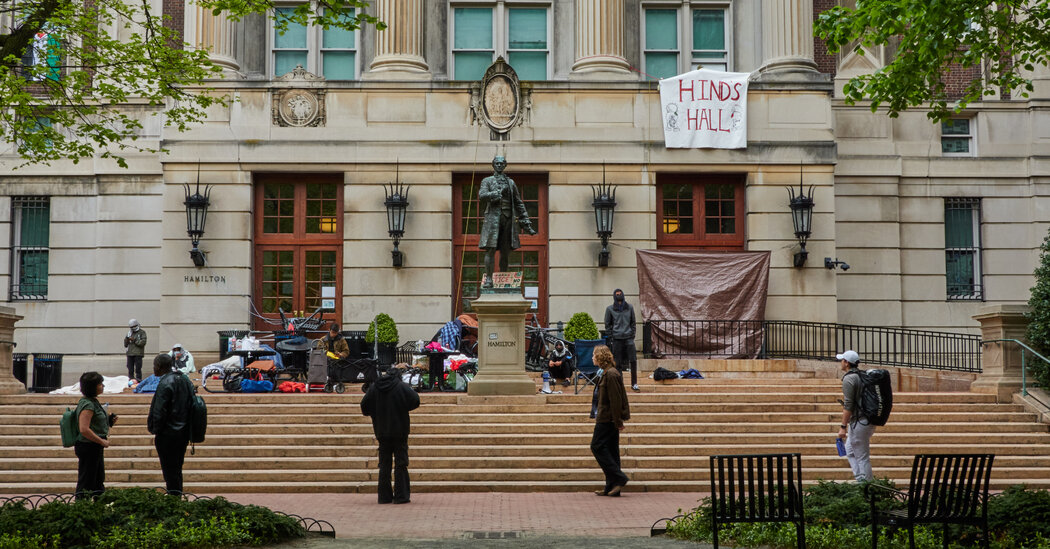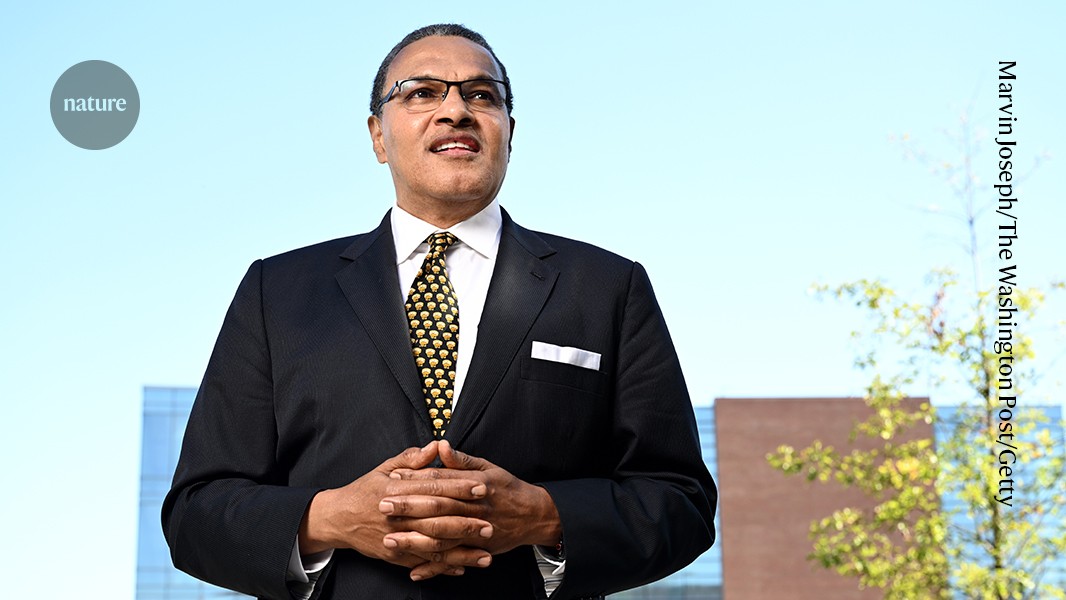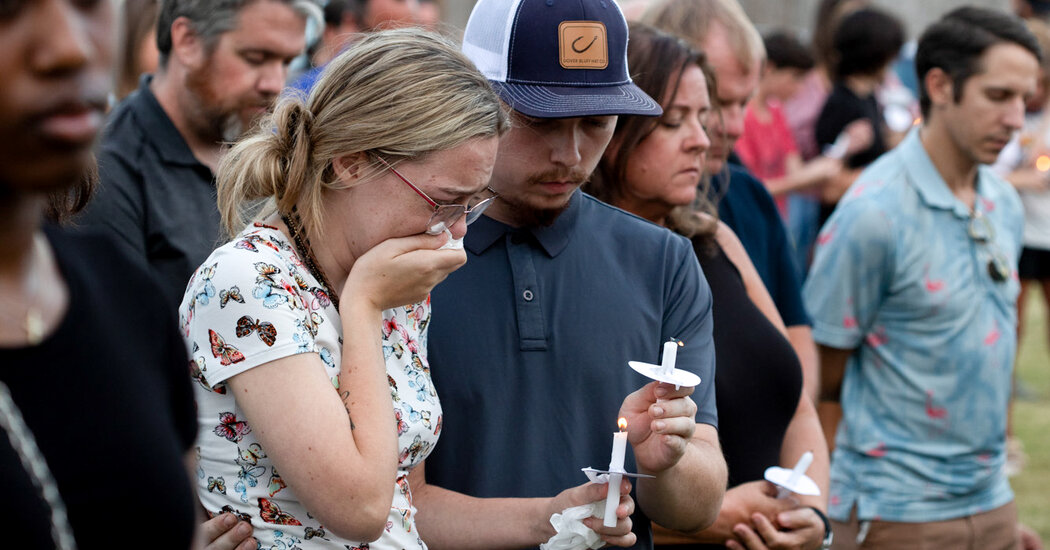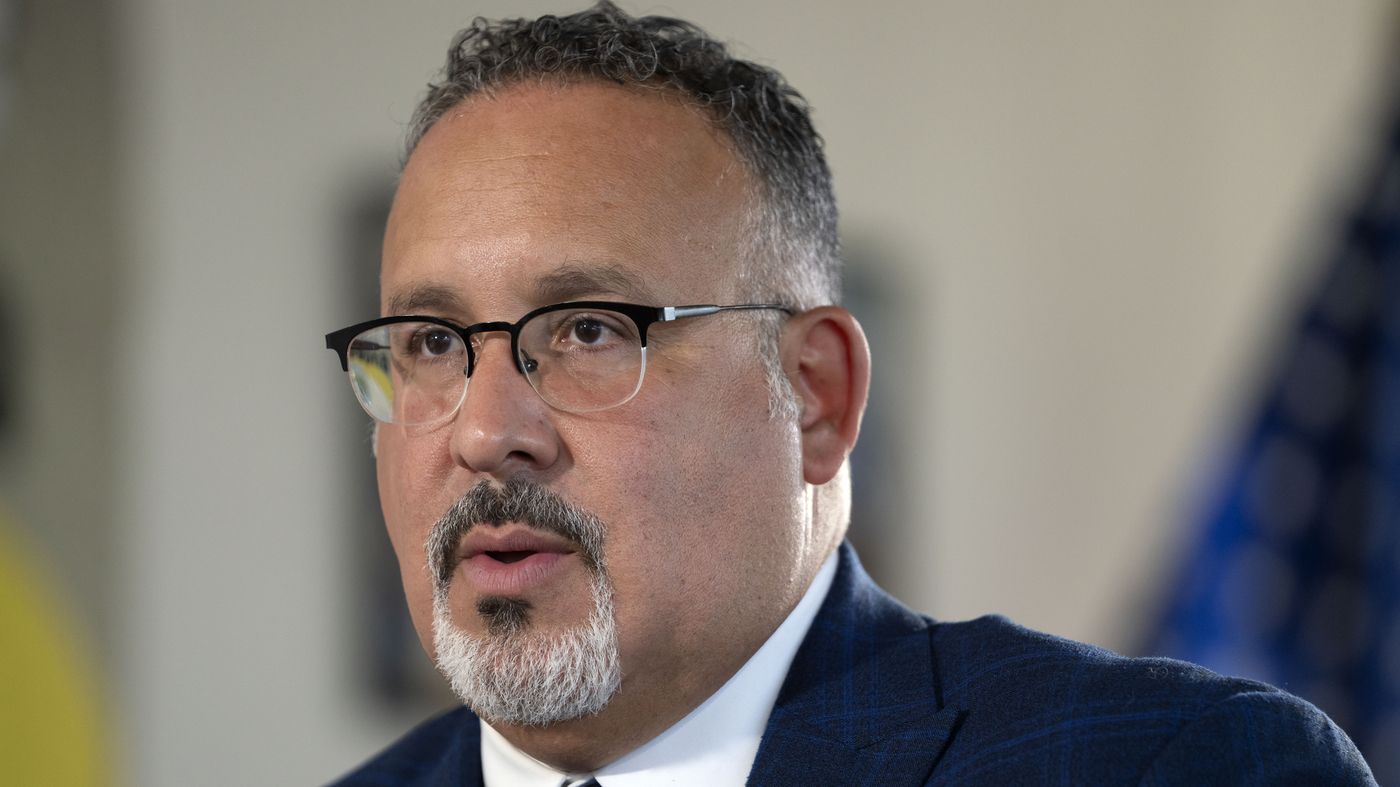Students and the Columbia Activists: Why the Students’ Campsites Aren’t They Already Encampped at the High School?
The students were already suspended for their part in the original campsite on the neighboring lawn. But that measure did not deter a wider group of protesters from setting up the current encampment.
The students entered Hamilton Hall and began moving furniture to a balcony as protesters began climbing into open windows in John Jay Hall, reported the university radio station.
University officials were not immediately available for comment. Though its public safety department was actively responding. It asked people to avoid the Morningside campus if they could.
The New York Police Department did not put officers on the school grounds because of the situation at about 2:15 a.m. It did not specify the number of officers in the area.
On Monday morning, Columbia administrators sent a notice to the protesters stating that negotiations with the leaders of the movement were at an impasse. It urged the students to clear out voluntarily to allow the school to prepare the lawn for graduation ceremonies.
In the discussions, student organizers worked in good faith to reach common ground andAcademic leaders put forward robust and thoughtful offers. “We thank them all for their diligent work, long hours, and careful effort and wish they had reached a different outcome.”
Faculty members and students are participating in protests of their own, to call for a cease-fire in Gaza and the boycott of companies that do business with Israel.
The Advisory Committee for Socially Responsible Investing will start looking at the new proposals from students after Columbia said it wouldn’t do that. There will be resources for health and education in Gaza as well as a list of investments available to students.
However, the parties did agree that protests will be paused until after reading day, exams and commencement, as Shafik urged the Columbia community to consider that the class of 2024 did not get to have their high school commencement ceremonies in person due to the coronavirus pandemic.
After that, students will need to submit an application at least two days before having a protest, which will be held in designated areas, Shafik said.
The Columbia Campus Camp, where Jews are allowed to speak freely and defend themselves: a case study of the student protests in Israel’s war against Hamas
She said that the campsite has caused an unwelcoming environment for Jewish students and that it’s in violation of the Civil Rights Act of 1964.
“Antisemitic language and actions are unacceptable and calls for violence are simply abhorrent,” she said. “I know that many of our Jewish students, and other students as well, have found the atmosphere intolerable in recent weeks. Many people have left the campus. To those students and their families, I want to say to you clearly: You are a valued part of the Columbia community. This is also your campus.
Shafik, who has been under fire for her handling of the protests, said she is committed to keeping community members physically safe and shielding them from harassment and discrimination, while allowing them to freely speak, which must mean respecting others’ right to do so as well.
For the second time in a week, police arrested dozens of demonstrators at the University of Texas at Austin protesting Israel’s war against Hamas. Protesters said “We are being peaceful, you are being violent.”
The scene at UT-Austin grew tense as campus police and state troopers deployed a chemical irritant to control the crowd. While some students dispersed, others were seen blocking police vans and resisting arrest. The university took quick action to preserve a safe learning environment, according to officials.
Yet other universities have taken a more hands off approach. MIT’s president has called for an end to the camp and police are observing the demonstrations, but a MIT source said there have been peaceful demonstrations.
The two graduate students were arrested and suspended from campus for setting up tents, and faculty signed a letter condemning their punishment and demanding their reinstatement. A group of 300 Yale professors wrote a letter to the university demanding that authorities drop charges against all of the 48 protesters who were arrested.
Many faculty members, disturbed by the forceful police response to protests, are increasingly standing up for students’ academic freedom — and pushing back against university leadership that they see as infringing on it.
Alex Morey, the Director of Campus Rights at the Foundation for Individual Rights and Expression, says colleges decide on how to regulate speech on campus. They give a list of where students can post flyers and what time of day protests should end. Those rules are allowed if they apply to any student group, according to Morey.
If I were a college administrator and there was a tentCAMP on the campus, I would let it lie because you can’t cause more disruption by removing it. But they do have the right to remove it if they choose to do so,” she says.
The assistant vice chancellor at the University of California, Berkeley says they avoid police involvement if it is absolutely necessary.
“Every action has a reaction, and sometimes the reaction is antithetical to what your goals are. Law enforcement is an important resource, but it can also have unintended consequences,” he says.
Students, faculty, and the university: The university faces an untenable dilemma: why protesters should not act like Palestinians and protesters, and why universities should act like they should
Berkeley’s protesters have been peaceful so far, says Mogulof. He says the school is committed to both free speech and to keeping the university safe and functioning.
There can be tension between the objectives. “And the trick is to manage those inherent tensions, the right to freely express your perspective, but also the right to pursue your academic interests.”
At Northwestern University, officials negotiated an agreement with protesters, making a plan on where students can continue to protest while not breaking the university’s rules.
Washington University in St. Louis told NPR in a statement that the university protects free speech, but that right doesn’t include activities that disrupt the functions of the university. On Saturday, university officials made the call to arrest 100 people it said “did not have good intentions” and were mostly unaffiliated with the school, according to a statement.
On Sunday, demonstrators at the University of California, Los Angeles breached a barrier set up to separate pro-Palestinian and pro-Israeli protesters, resulting in “physical altercations,” according to a university spokesperson. Campus police eventually separated the two groups.
Professors at Northeastern University, where over 100 people were arrested on Saturday, sent university leaders a letter urging them to drop charges against protesters and issue a public apology and retraction of false allegations of antisemitism, among other demands. A group of professors from the university signed a letter expressing their support for student protesters and complaining about the response.
“All of these factors, taken together, left university leaders with no choice but to act,” Chancellor Ken Henderson and Provost David Madigan wrote. “Over the weekend, like many colleges and universities nationwide, Northeastern faced an untenable dilemma.”
Jewish students at several universities have reported feeling unsafe. A group of Jewish students at the University of Minnesota have seen “violent and hate-filled messages” and no longer feel safe. The Jewish student groups demanded that campus officials take better care of their safety.
He claims that politicians and donors may be interested in responding harshly to schools. Hundreds of alumni at Columbia signed a statement this week demanding the school disciplined students who engage in threats and hate speech.
Columbia University switched to hybrid classes at the end of the semester. The University of Southern California has canceled its main graduation ceremony in favor of forming volunteer protest and disruptions response teams, and the University of Michigan is planning to involve volunteers in its May graduation ceremonies.
The students who stayed in the camp after the deadline would be the ones who got suspended, not the hundreds of others who came to the camp during the day.
The co-chairs of the trustees of Columbia said in a statement that they wanted the N.Y.P.D to clear the campsite once. It would be counter productive to bring back the N.Y.P.D. at this time, as we all know, and that is what the community has told us.
Protesters at Columbia took over Hamilton Hall early in the morning as part of a campaign to support Palestine. Protesters took control of Hamilton in less than 20 minutes, which was a long time since they last occupied the building. A spokesman for Columbia wasn’t immediately available.
“Palestine will live forever.” Go away, yo. “Free, free Palestine.” It is free, free, Palestine. Shut it down. Palestine will be free. “Disclose, divest, we will not stop, we will not rest.”
The Seattle neoclassical building where the pro-Palestinian encampment is located: a tense day at Columbia
Outside the neoclassical building, protesters, many wearing helmets, safety glasses, gloves and masks, barricaded the entrance. Those inside stacked chairs and tables at the entrance. A protester took a hammer to smash the glass part of a door. The protesters seemed to have complete control of the building.
Tuesday promises to be another tense day at the Columbia campus in Manhattan, with students bracing for possible further action against the pro-Palestinian encampment on campus and administrators waiting to see if their decision to suspend demonstrators who remained at the site would blunt the protest.
Some people in Portland took over the library at Portland State University on Monday, holding up signs with slogans like “Free Gaza” and “Glory to Our Martyrs” as they demanded the university cut ties with Boeing which has supplied weaponry to Israel.
Bob Day, Chief of the Portland Police Bureau, believed between 50 to 75 protesters were inside the building. Officials urged protesters to leave the area and warned that those involved could face criminal charges.
Students and hundreds of their supporters rallied around the site in a show of force meant to prevent the removal of its tents. But with no sign of police action, most of the protesters had begun to disperse by the end of the afternoon, leaving what appeared to be several dozen students and about 80 tents inside the encampment.
Around a dozen faculty wearing safety vests stayed behind, with several saying they would stay overnight to ensure their students’ right to protest was respected.
“We have begun suspending students as part of the next phase of our efforts to ensure the safety of our campus,” Ben Chang, a spokesman for the university, said.
She said that it was against the will of the students to break up. “We do not abide by university pressures. We act according to the will of the students.
Elga Castro, 47, an adjunct professor in the Spanish department at Barnard College, Columbia’s sister school, was among the faculty and staff members guarding access to the tents. She said that she had her opinions on Gaza and Palestine but she was mostly here to protect her students.
The Protest against Campus Protests and the Principle of Shared Governance: Professors, University Administrators, and the Students of Freedom of Speech
“If you’re not upholding it when it’s needed, then it means nothing,” she says. “The first thing is going to have to be a rebuilding of trust. It takes a long time for trust to be built and repaired.
She says most schools already have mechanisms — like faculty senates and academic councils — through which faculty members and administrators can engage with each other over what’s happening and how to respond. She says many schools are ignoring that structure.
The principle of shared governance — which the AAUP defines as the “joint responsibility of faculty, administrations, and governing boards to govern colleges and universities” — is key to helping campuses move forward, Mulvey says.
And faculty members at some schools — including Barnard, Emory, UT-Austin and Cal Poly Humboldt — are issuing votes and statements of no confidence in their presidents, over their response to campus protests.
“The use of policing, penalization and retribution to avoid protest or dialogue with students cannot stand, as this is no model for an educational institution,” the Yale professors wrote.
“As a faculty that is explicitly charged with teaching our students about these values, we strongly dissent from these anti-democratic acts,” the Indiana professors wrote.
My job at this time of the year is to protect the students and to protect academic freedom. I can do that better than they can, she said. “And I think that’s what we’re seeing with faculty all over, both wanting to protect the students and wanting to call out administrations that are actually putting the students at risk.”
Some are speaking up based on their subject matter expertise, like history professors at the University of Southern California and media school professors at Indiana University.
“As a faculty member who cares about freedom of speech — who sees freedom of speech as the bedrock of democracy and really as the foundation for a public education — I see it as my responsibility to speak up when I see harm being done to students and their rights being violated,” Phillips said. “And if my voice isn’t enough, then I’m going to have to speak up, so to say, for them in other ways.”
Some of her students were completely peaceful, standing face-to-face with riot police, when she arrived at the protest site. Reflexively, she started walking toward them.
She told NPR that her instincts just kicked in. A few moments after that, I found myself on the ground, handcuffed and being marched with other faculty and students to a bus that would take us away to the local jail.
The students were protesting at the site of an outlying area that was banned by the school administration in a last-minute policy change.
A few days earlier, on Thursday, Indiana state and university police had arrested 33 people as they tried to disperse the crowd. Protesters quickly regrouped, and Phillips was alarmed to hear on Saturday that armed police were once again gathering at the park.
Twenty years ago, she said, she probably would have been one of those protesters. She is concentrating more on the issue of higher education administrators delignified any kind of dissent by curtailing free expression, instead of the Israel-Hamas conflict.
Demonstrators at Indiana, as in many other states, are calling for a cease-fire in Gaza and an end to both university investment in Israeli-affiliated companies and its partnership with a nearby U.S. Navy installation.
Source: How some faculty members are defending student protesters, in actions and in words
Campus Protests, Faculty Arrests, and No-Confidence Votes: How faculty members are defending student protesters, in actions and in words
Most of the people arrested on Saturday, including Phillips, were hit with the misdemeanor charge of criminal trespass. The exception was the one who was banned from school property for five years and was handed a slip of paper from the university police.
The administration later said that students and faculty who were arrested can appeal their trespass warnings with university police, and will be allowed on campus to finish the semester while that process is underway.
The man plans to do that. She says it is important for professors to meet with students in the last week of class, and that experience has already been disrupted. Students presented their projects on the internet rather than in class on Monday.
“If we violate the terms of the ban, we’ve been warned that the consequences could be worse than they are right now and that we should be careful not to do so,” she said.
Protests at Indiana continued, with demonstrators now calling for the president and provost to step down. More than 800 current and emeritus faculty members from the school have also signed an open letter calling for their resignation or removal.
Faculty at Columbia University formed a wall at the entrance to the students’ camp as police arrived to break it up on Monday. Professors at Emory University staged a campus walkout that same day, chanting “hands off our students.”
“I feel like faculty are in triage mode right now,” said Irene Mulvey, president of the American Association of University Professors (AAUP). “They’re helping the students, putting their bodies on the line … They are dealing with the administration with no-confidence votes, but also trying to get them to back off and do the right thing.
Source: How some faculty members are defending student protesters, in actions and in words
Campus Protests Faculty Arrests Letters No Confidence Votes: Steve Tamari’s Detention after a Demonstration at Washington University
A video shows several officers slamming Steve Tamari to the ground after he was arrested during a protest at Washington University.
A student read a statement on Tuesday that said Tamari was dragged across campus by the police after he was slammed and crushed by their weight.
The administration at the school called in the city and state police to clear a protest, which resulted in the arrest of 28 people. Both high-profile arrests were captured on bystander videos.
In one, economics professor Caroline Fohlin approaches several police officers as they wrestle a protester to the ground, asking “what are you doing?” and telling them to get away. As she approaches, one officer grabs her by the wrist and flips her onto the sidewalk. Another comes over to help zip-tie her hands behind her back, as she protests: “I am a professor!”
Fohlin was later charged with battery against a police officer. Gregory Clement told the Atlanta Journal-Constitution that the arrest was wrong.
Clement said that Fohlin was not a protester on the 25th. “She emerged from her office, concerned only about the treatment of students on the quad.”
The other professor arrested, Noëlle McAfee, was captured on video urging bystanders to notify the philosophy department — of which she is the chair — of her arrest as she is led away in handcuffs.
McAfee later told 11Alive News that she was passing through the area of the protest when she came across cops “pummeling” a young protester, and stood nearby asking them to stop. She was charged with disorderly conduct after she refused to leave when police told her to.
Source: How some faculty members are defending student protesters, in actions and in words
The Chicago Student Reaction Camp, which was organized by the Educators for Justice in Palestine, through Steven Thrasher’s role as Chair of Social Justice
Steven Thrasher is chair of social justice in the Medill School of Journalism atNorthwestern University, and he has been acting in the role of faculty support for the student revolt on the Illinois campus.
He and other members of the group Educators for Justice in Palestine had to mobilize to ensure there were faculty available for bail support, university negotiations and physically defending student protesters at the camp.
“We’re trying to make sure the students know that we are there and we have four of us there as well,” Thrasher said. “But … we did not expect to be in a human barricade position in the first 10 minutes, which is what happened [Thursday] morning.”
At protests, he claims to be a person who’s willing to be arrested. He hopes that doesn’t happen, but says he feels “quite committed to, if there’s violence that can happen between the students and the administration or cops, that I’m going to put my body in that space when I’m there.”
I would think that if I saw students that disagreed with me, it would be a good thing. I would also intervene” on their behalf, he said. I’m very proud of them and I’m supporting them in what I think is very righteous.
Several faculty members have stated in speeches and social media posts that they fear losing their jobs or facing other repercussions for speaking out.
Mulvey, of the AAUP, says it’s riskier for non-tenured professors to take a stand — and the long-term decline in tenure at American universities means that most do not have it. She said those dynamics are damaging not only to higher education institutions but democracy itself.
The way forward for Mulvey is through education both inside and outside the classroom. Thrasher, at Northwestern, agrees. He’s teaching a seminar called “The Theater of Protest,” and accompanied his students to the protest camp for a field trip on Monday.
Like Thrasher, she says the best thing to come out of this turmoil is the deepening of solidarities within the community — she says she’s spent time with colleagues in ways she hasn’t in her more than two decades at the university, and seeing many newly emboldened to stand up for their beliefs.
“There’s definitely no more business as usual,” she says. “We have really come together in a way that has shown how fragile community can be, but also how important community is.”
Source: How some faculty members are defending student protesters, in actions and in words
Do professors bend over backward to fulfill their academic obligations to their students? — A Conversation with H.D. Roper at the University of Washington, DC
“My feeling is that most faculty will bend over backward to fulfill their academic obligations to students, regardless of whether it is a written final, extensions on projects, or additional office hours,” she said.



